Their eyes are shimmering blue: a crystal clear promise that these dogs will never see again in their lives. Their fur, ranging from rustic pale yellows to dust ridden browns, is matted with neglect.
More common than not, however, these dogs don’t have any fur to neglect; infections causing loss of hair leaves nothing but blood and flaking skin.
The brutal Thailand heat doesn’t help, either. The sun all but cooks these lesions as the dogs try to stay cool and comfortable in conditions that make for anything but.
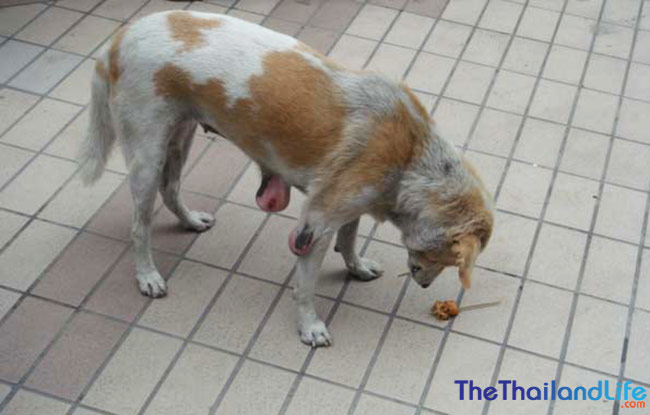
A soi dog, riddled with tumours, stares down at a piece of meat on a stick.
For those dog lovers who treasure and cherish man’s best friend as if they are their own flesh and blood, it might be overwhelming to hear of animals in such condition, but this is all but unusual in the streets of Bangkok, Thailand.
Street dogs, or soi dogs, have become an ever-growing problem for tourists, expatriates, Thais and, most importantly, the dogs themselves.
While the actual estimate is unclear as to how many dogs are roaming the city, one thing remains certain: something has to be done to reduce the number of stray dogs who seek refuge in the streets.
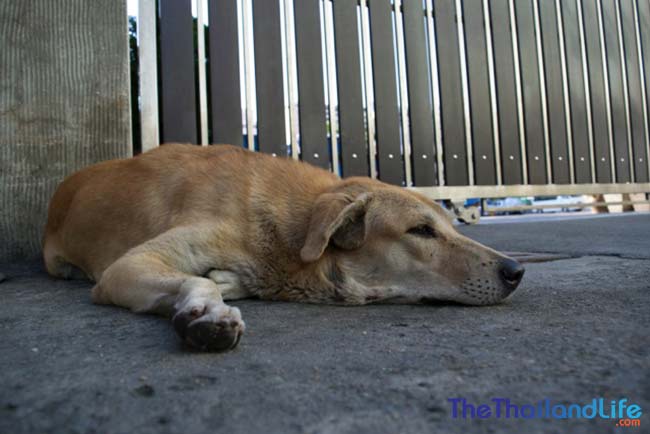
The Soi Dog Problem
About 300,000 strays wander the streets of Thailand’s capital. The City of Angels is one slowly becoming a city of dogs … homeless ones at that.
They do not fall from heaven,” Thomas Jäkel, founder of Khlongdogs, said. “They come from humans first.”
Khlongdogs is a private charity created and funded by Thomas and his wife, Paporn Jäkel. More than 16 years ago, Paporn and Thomas started the non-profit with a single dog named Nicky. They found her on a farm outside of Beijing, China, where she had been neglected and malnourished; infested with ticks, fleas and worms.
“She was ‘useless’ because she did not fit the looks required by the People’s Liberation Army who usually bought dogs from this farmer, so we paid the farmer and took Nicky with us,” Thomas said. “She lived with us until her last day.”
Dog ownership has been tightly regulated in China for some time now, and regional governments have even been known to kill stray animals before. Beijing bans ownership of dogs larger than a certain size, as well. The Jäkel’s moved to Thailand after they got Nicky, and it was then that Khlongdogs began.
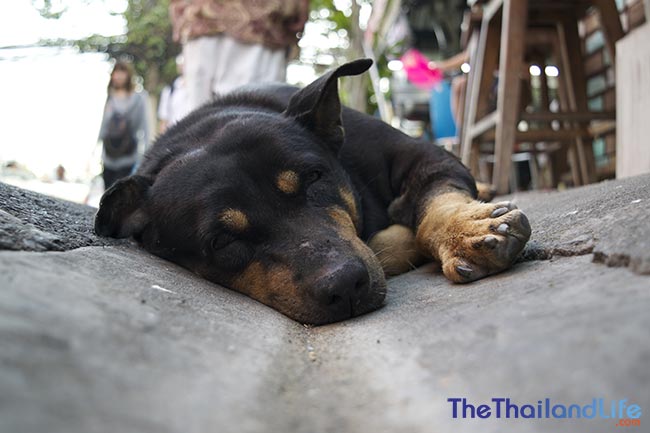
They now have 12 dogs and 22 cats living in their home in Bangkok, Thailand. Over the years, however, they have taken in over 50 animals and rescued or aided more than 150 dogs and cats. They would open their home to more animals if they could, but they simply don’t have the means or space.
“We are fully booked,” Thomas said. “The problem is not us, because I would take more. There are many serious cases.”
While Khlongdogs cannot take in every stray, Thais will oftentimes give food to the soi dogs. Buddhism is practiced by 95 percent of the population in Thailand, and Thais feed the dogs in order to make merit.
This, however, is not enough. Much of the food lacks the required nutrition to sustain a healthy dog, and many of the dogs are suffering from more than just hunger.
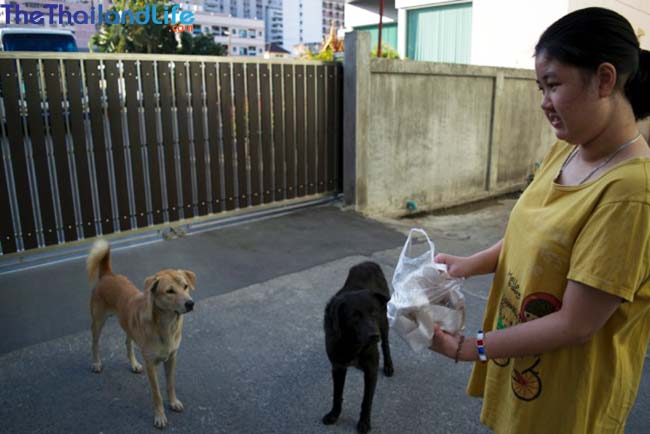
Why So Many Dogs End up on the Street
The ever-growing soi dog problem stems from a relatively simple reason: owners are not spaying and neutering their animals. Owners then abandon their dogs in the streets, because they don’t have the means to take care of them.
“The problem starts with the irresponsible owners who don't neuter the dogs and let the dogs roaming around the neighborhood,” Tharinee Wipuchanin, founder of Pic-A-Pet4Home, a shelter in Bangkok, Thailand, said. “Once the dog get pregnant and gave puppies, they would be dumped at public area.”
That, or because the once adorable, cute puppy becomes a dog that is no longer a novelty item.
I save one, they dump another three,” Thomas said. “It’s an endless story.”
These dogs are out in the streets surviving amongst other strays, and some wind up having more puppies. Just recently, Paporn hired a dog catcher to roundup four female dogs. They had been having litters on a railroad track of up to eight puppies at a time, of which only a handful survived.
Because of Khlongdogs’ limited funds, Paporn can only focus on spaying female dogs. There is simply not enough money to help every animal in need.
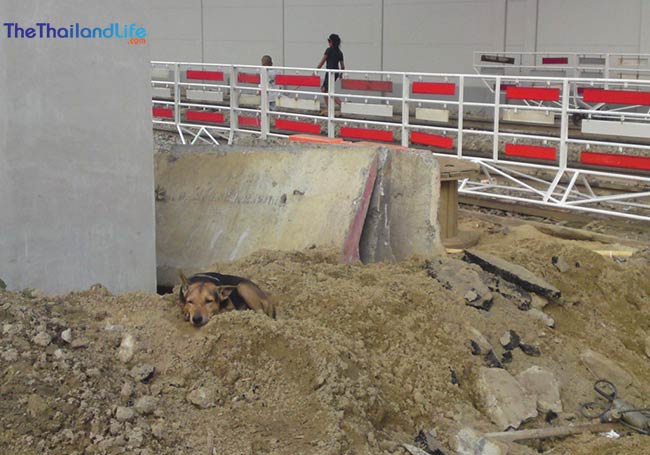
A pile of sand makes for a comfortable bed
Neglect Is Putting People's Lives at Risk
This huge problem goes beyond malnourished, mistreated, disease-ridden dogs. The sheer volume of strays is presenting a genuine risk to the public.
For example: A pack of stray dogs attacked a Thai-German boy on Pattaya Beach and, in a different attack, vagrant dogs left an 8-year-old covered in blood and on the verge of death before being rushed to the hospital.
Danial Haaby, a graduate student from the U.S., was bitten by a stray dog while working on his TESOL certification in Hua Hin, Thailand.
“The dog quickly turned towards me and bit as hard as it could into my heel from behind, Haaby said.”
Haaby was bitten after apparently spooking a sleeping soi dog in an alley on his way to the beach. His presence just a couple of feet from the stray landed him in the hospital needing stitches, multiple wound cleanings and a series of rabies vaccinations.
“I think what I learned from being bitten and my dealings in general with street dogs in Thailand is that there is a certain level of caution that they demand beyond domesticated dogs,” Haaby said. “They are frequently abused which makes it easier for them to attack people.”
Frequently abused is an understatement. Of the countless number of animals that have taken refuge in the Jäkel’s home, the majority of their backstories are so horrific it seems almost impossible that there could be any truth to them. Brain damage, broken spines and legs, missing legs, intestinal issues, distemper virus, rabies, loss of sight: the Jäkel’s have seen it all.
“This is unacceptable,” Paporn said. “This is not their fault.”
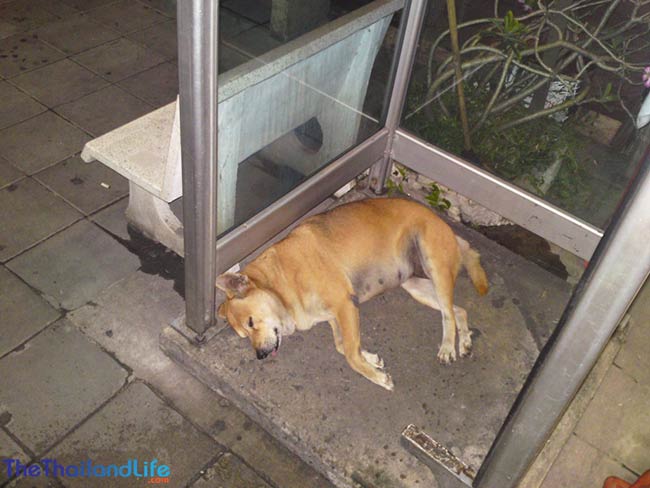
Wherever I lay my head, that's my home…
Thailand is taking baby steps when it comes to protecting their animals. Elephants still carry the weight of excited tourists on their back. Tigers are used for photographs. Orangutans fight in boxing rings in order to light up crowds as they adhere to trainers standing idly by the ropes. Where does that leave soi dogs?
The 2014 Prevention of Animal Cruelty and Provision of Animal Welfare Act was finally passed by the National Legislative Assembly after years in the making. The law will punish those people who neglect or torture animals, fail to properly take care of them and transport animals in unsuitable vehicles that lead to death or injuries.
The government doesn't see the problem as important and urgent so the budget is limited and no serious protocol is set to control the stray population,” Wipuchanin said. “This is why there are so many street dogs.”
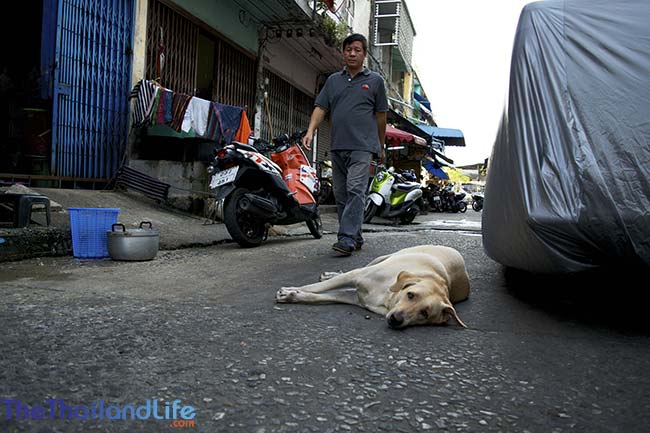
Pet owners will hopefully take notice of this and be more responsible in caring for their pets. If they don’t, the legislation seeks to impose harsh punishments, including a one-year jail term, a fine up to 20,000 baht, or both. While this is a step in the right direction for those animals who have not had a voice for so long, it is still not enough.
“I think we should limit the puppy mills,” Paporn said. “They should completely stop.”
She doesn’t see that happening anytime soon, however.
“They are a business,” Paporn said. “This is a bloody business.”
What's the Solution?
Regardless of Haaby’s close call with a soi dog in the alleyway of Hua Hin, Thailand, he is still able to understand and empathize with those dogs living on the streets.
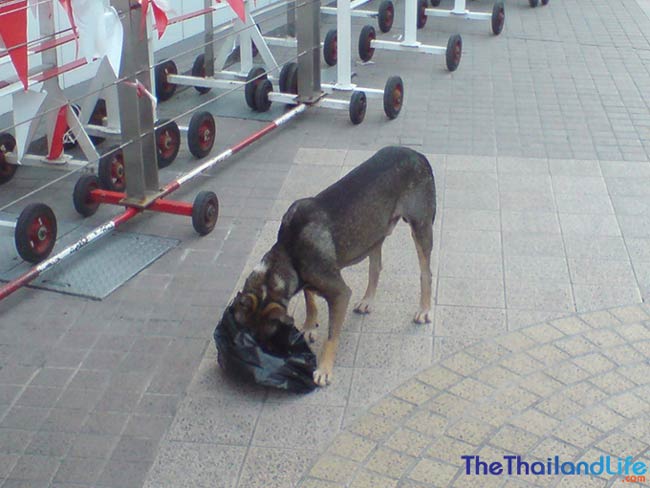
An underweight dog investigates a rubbish bad outside a shopping mall
“I always loved dogs and still do, but I seem to have a higher level of caution around them now, even in America,” Haaby said.
Haaby thinks the stray dog problem in Thailand could benefit from the fostering of a more humane environment in general for dogs. For foreigners, however, Haaby said it is especially important that they know the difference between feral dogs and domesticated ones, and act cautious in the presence of those dogs who are not domesticated.
“They are not pets and many of them are dangerous if you don’t pay attention to their boundaries,” Haaby said. “They are wild animals looking out for themselves in a rough environment, not what we are used to dealing with when it comes to dogs in countries like the U.S.”
Wipuchanin said that although the street dog problem is Bangkok is decreasing, there are still many steps to be made in resolving it completely.
“Register the owned dogs using microchip and seriously punish those who let their dogs roam around the neighborhood and those whose dogs create problem,” Wipuchanin said. “Control and register breeders. This is a big problem when it comes to aggressive breeds. They were dumped because of their aggressiveness. Breeders also dump unwanted or unsold dogs.”
She also said that the government should be providing sufficient neutering services to all dogs, as well as educating people on how to be responsible pet owners, especially younger people.
“This should be added into the school curriculum,” she said.
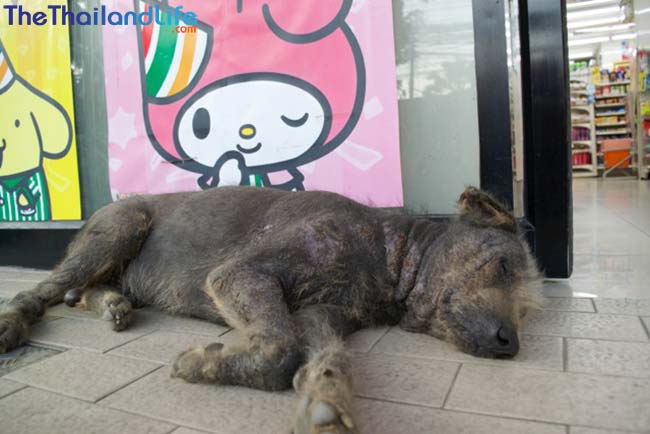
A soi dog cools off as the air-con escapes through 7-11's automatic door.
How You Can Help
Khlongdogs encourages foreigners to feed the street dogs when possible. People should inform organizations like Khlongdogs when they come across a street dog that is in particularly bad shape. Donations are also very helpful.
“The cost of food, medication, hospital bills and caretakers are about 30,000 to 50,000 baht per month,” Wipuchanin said. “This will fluctuate on the vet bills per month.”
The Jäkel’s estimate that they spend about $1,500 a month on the rescued animals that live in their home. This estimate does not include the food and care they provide to the dogs and cats that reside in temples, the price of weekly feedings they go on in different areas around the city as well as the odd jobs around Bangkok they undergo when needed.
“This house must be secure if we have donations or not,” Thomas said.
Those wanting a pet should not import a dog or buy from a breeder: there are enough soi dogs to go around. There is a stigma that street dogs are all combative and attack humans as well, but this is not true. While some street dogs eventually become aggressive, due to abuse or lack of food, the cause of this aggression towards humans is brought on by negligent owners and animal abusers in the first place.
It is possible to look past the matted fur and infections the streets have left these dogs in and remember … they are still just dogs.
“They all look good if you treat them nicely,” Thomas said.
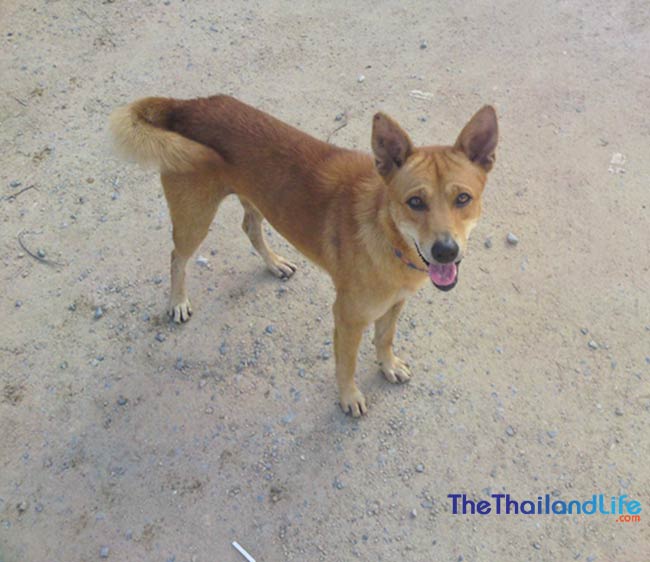
Written by Kelly Iverson – Thailand expat & travel writer.
Last Updated on
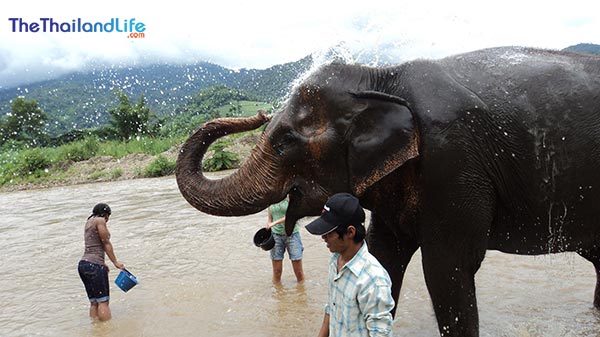
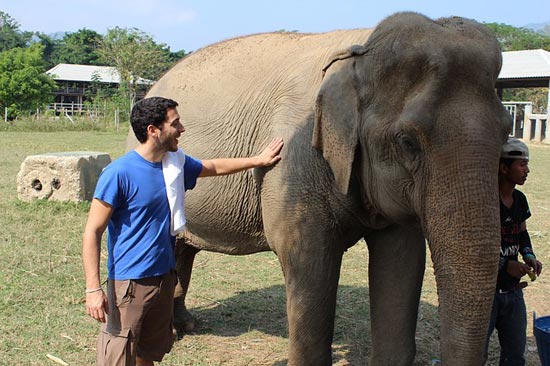

Ruth says
There are millions of dogs and cats killed in the states every year because of dumping, abuse, neglect, lack of care, age, economically expired for breeders, straying etc. and they are not rehomed or claimed before they are legally killed.
I think that spaying and neutering as well as registration and breeder controls help to manage neglected companion animals' populations.
But simply allowing continued 'breeding for profit then killing off the left overs /spares
Many 'western' countries treat companion animals with minimal respect and care and have yet to reach a sophisticated level of 'evolution', whatever that is....
Sep 15, 2024 at 11:45 am
Rod says
Nov 28, 2019 at 6:51 am
TheThailandLife says
Nov 28, 2019 at 5:37 pm
Jag says
Go home if you don't like it.
Hmmmm, let me see, if I was a dog would if prefer the "western" way of having my balls cut of at an early age, being locked up alone in a backyard all day while my "owner" is at work, only being taken out with a rope or chain around my neck and being fed shit canned food day after day.
Or the Thai way of, keeping my balls, having my freedom, scoring a delicious variety of Thai foods, and be able to go out hang out with my mates and bang bitches everyday.
I think I would prefer the Thai way, rather than be a lonely ladyboy farang dog. Farangs are so selfish, but like to make out they are superior and are doing the right thing for the animal, but really they are doing it for themselves.
Sort of like the farangs who "rescue" prostitutes of the street and marry them claiming to be helping them, but really, they just want a cheap sex slave.
Most Thais can see through this crap. Never trust a farang do gooder.
Feb 05, 2018 at 1:50 pm
TheThailandLife says
Feb 06, 2018 at 11:44 pm
Craig Johnson says
Mar 20, 2018 at 8:23 pm
VoiceofReason2 says
In the west I hate dogs -- they all act mentally ill.
Love the soi dogs in rural Thailand... always super chill, super happy, fit looking, have fun with their local crew, tails always up.... not hyperactive, insecure and NUTS like most dogs in the west. And their owners
Feb 02, 2022 at 9:24 pm
jennifer oleary says
Jan 10, 2025 at 1:42 am
Will MacCormac says
Jun 14, 2017 at 9:49 pm
Yann says
good of you to do what you have done for that poor dog who probably got kicked by some ass whole it makes me feel good to see that some people do care.
Aug 29, 2017 at 10:05 pm
TheThailandLife says
Aug 30, 2017 at 4:48 pm
Yann says
Yes it does cost me a little bit of cash,but better do that then get drunk every night like many Thai's do and I feed them chicken legs and liver and meat balls that I make for them with a little bit of rice.
So many people who are retired with nothing to do should do the same as it gives you a purpose in life and it is not that costly,I realize that feeding a dozen soy dogs is not many but if everyone that can,would do their share thousands of soy dogs would be fed and a little bit of sunshine brought to them for a short time
May 10, 2017 at 10:46 pm
Rochelle says
Apr 05, 2017 at 8:48 pm
TheThailandLife says
Apr 06, 2017 at 3:08 pm
peter says
Feb 21, 2017 at 9:53 am
TheThailandLife says
Feb 21, 2017 at 8:19 pm
Craig Johnson says
Mar 20, 2018 at 8:26 pm
TheThailandLife says
May 09, 2016 at 9:57 pm
Ken says
As for Buddhist beliefs getting in the way of a solution, you are probably right about that. But then again I don’t really know much about Theravada Buddhism. I do know however that Japan is a Buddhist nation (although not Theravada) and they deal with strays in pretty much the same way that we do here in the States.
And as for my own personal beliefs I’m afraid I just don’t take death that seriously. Death is just part of life. Bodies wear out and die just like everything else in the universe and I find nothing particularly tragic or scary about this. To me the real tragedy is having to suffer greatly while one is still alive and I don’t see the point of staying alive merely to suffer.
Of course, as pathetic as these animal look, I guess none of us really knows how they feel about their lives or how much they may, or may not, be suffering. And after all, even in the wild tens of billions of animals die every year from starvation, disease, or being eaten by other animals. So maybe being a homeless dog in Thailand is actually a more comfortable existence than being a wild animal living in the wild.
May 10, 2016 at 4:43 am
TheThailandLife says
May 10, 2016 at 1:33 pm
Heather Martin says
Nov 25, 2017 at 7:29 pm
Ken says
I actually have a lot of respect for people who start private animal shelters in Thailand or otherwise try to help out these poor animals. But the reality of the situation is that their noble efforts basically amount to the equivalent of trying to bail water out of the sinking Titanic with a shot glass. In other words, until most animals are being spayed and neutered and until there are government run shelters and animal control workers they are always going to multiply faster than we can get people to help them. And unfortunately there is not much that can be done about it until Thailand reaches a different stage in its evolution.
Even here in the States people rarely spayed or neutered their pets back in the 60’s when I was growing up. And even today a lot of people in poorer areas still don’t. This is partly due to the fact that they are less able to afford these services and partially due to the fact that people in poor areas just tend to be less socially responsible than their middle class and upper class counterparts.
Of course even back in the 60’s all American cities already had a well-established animal control system in place. Stray animals are picked up and held until someone comes to claim them. And if nobody claims them or they cannot be adopted out by a certain date then they are euthanized in most cases. To some this might seem cruel but most modern societies have decided that this is the most humane approach. These places of course also ensure that people’s pets are registered and that they have all their shots.
In any case, unfortunately I think you’d be hard pressed to find any nation in the same stage of its development as Thailand that has any kind of government run animal control system in place. And as I said before, in the USA these services came along WAY before we actually got the public to finally start being more responsible about spaying and neutering their pets. So things will likely progress in the same manner in Thailand.
The point is, until the government sets up effective nationwide animal control services I’m afraid that all the well meaning individuals in the world are not going to be able to even make a tiny dent in the problem. It’s sad but that’s just the way it is. Still it always feels great to help an animal out and we all should do our part.
Of course, ironically, it would also be sad in a way if all the soi dogs just up and disappeared one day. As weird as this sounds it just wouldn’t feel like Thailand to me without all the stray dogs running around (laying around that is).
May 05, 2016 at 12:11 pm